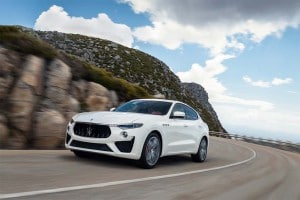Fiat Chrysler reported higher than expected operating earnings, setting a new record of $2.18 billion in the process, during the third quarter just ended. The results come just as it finalizes a deal to merge with France’s PSA Group.
The automaker’s adjusted EBIT of €1.96 billion for both the Group and North America is a new record. It also revealed it set new benchmarks with margins of 7.2% and 10.6%, respectively. The automaker confirmed its full-year guidance of adjusted EBIT over €6.7 billion.
The results were driven largely by a strong performance in North America.
(FCA/PSA Merger Relied on Long Friendship Between Competing CEOs)
“Our strong Q3 results, built on record North America profitability, put us in a position to deliver our full-year guidance and to further improve financial performance in 2020. In addition, changes to our product portfolio plans are central to our strategy to improve performance in EMEA and Maserati,” said FCA CEO Mike Manley.
The negatives from the quarter included in non-cash impairment charges of €1.4 billion stemming from product portfolio changes and a net loss from continuing operations of €179 million. The company’s revenue also dropped slightly, 1%, to €27.3 billion.
The change in the company’s portfolio come from primarily for Europe in the A-segment, as well as for Alfa Romeo. The company is going to scale back Alfa’s presence in North America. Additionally, shipments down 11%, primarily due to continued dealer stock discipline; however, the decline was partially offset by volumes of all-new Jeep Gladiator.
(Parlez vous Francais? Here are some of the potential benefits from FCA’s proposed merger with PSA)
The company’s record Group Adjusted EBIT and margin result during quarter came in large measure from a positive product mix (i.e. strong Jeep and truck sales) and increased pricing, despite lower shipments. North America also achieved record results, with €1.96 billion in Adjusted EBIT along with 10.6% margin.
In Latin America, FCA noted it continues to “deliver improved profitability as both Adjusted EBIT and margin were higher compared to last year.” The company also noted that Maserati suffered through a tough quarter, reporting that shipments were down 48% during the period. The drop was attributed to lower sales and planned reduction of dealer stock.
The result was a adjust EBIT loss of €51 million on net revenues of €394 million. Despite the sour result, officials were looking forward to the changes coming to Maserati’s line-up and their impact on the company.
“During the quarter, we announced our updated Maserati product plan in which all new models will offer full battery electric propulsion systems, which will offer unique driving modes, extended range and ultra-fast charging capabilities. All new Maserati products, including the updated current models, will also offer a range of autonomous driving capabilities, starting with Level 2 enhanced highway assist progressing to Level 3,” the company noted.
(How the French and Japanese governments scuttled the FCA/Renault merger)
The first electrified Maserati will be a hybrid electric Ghibli, which will be launched in 2020. The first all-new Maserati, which is still unnamed, at least publicly, will also launch next year.


